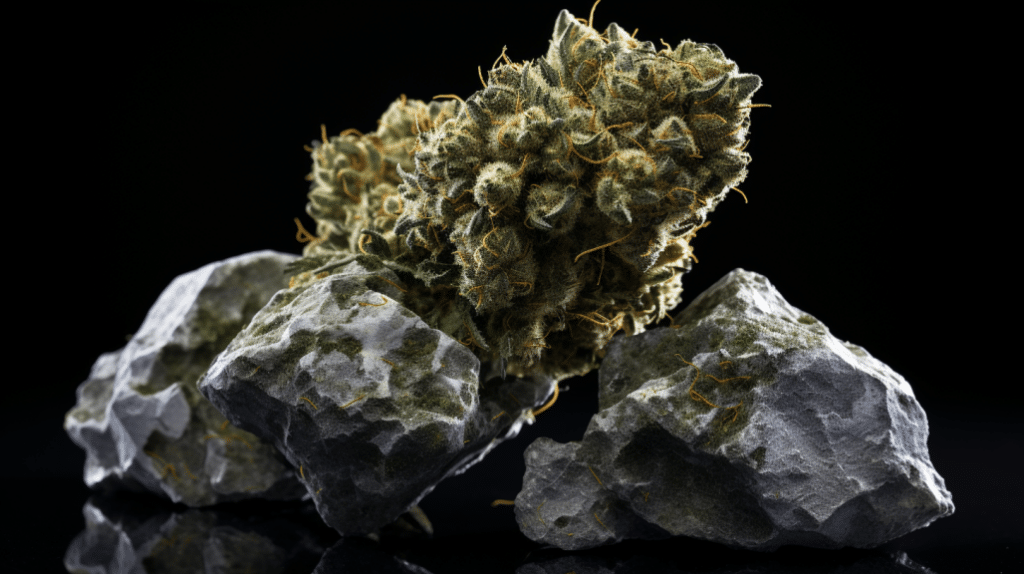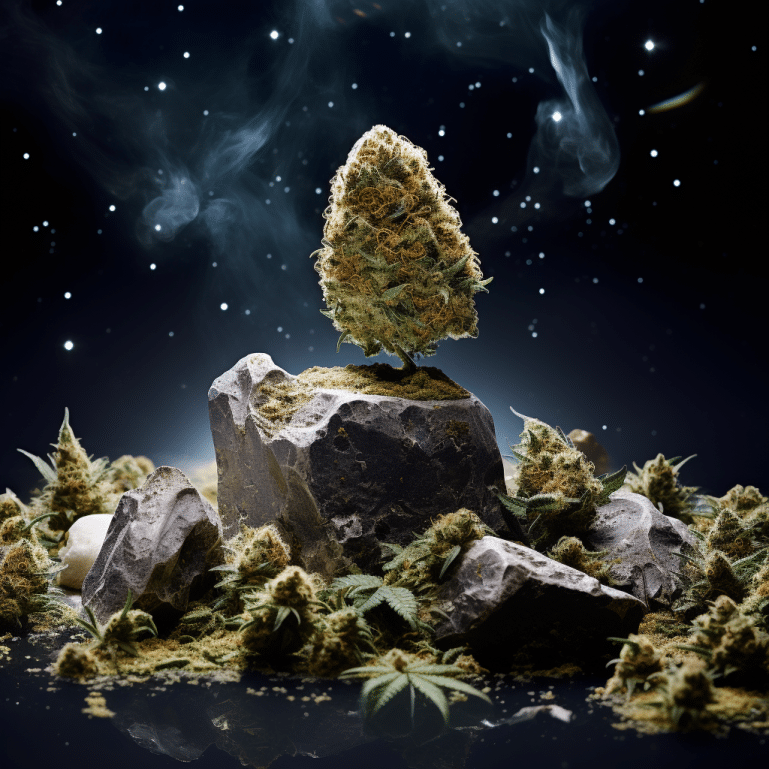Cannabis use is associated with neurological and psychiatric side effects, but the risks of highly potent forms like “moon rocks” are not fully characterized.
This case report describes psychosis and new-onset seizures in a 20-year-old following the first-time use of this THC-concentrated preparation.
Key Facts:
- Moon rock cannabis contains high levels of THC, which acts on cannabinoid receptors in the brain
- Acute and chronic cannabis use can induce psychosis, suicidal ideation, cognitive changes
- Evidence for cannabis effects on seizures is limited; may have both anticonvulsant and proconvulsant actions
- This patient developed psychosis and recurrent seizures after using moon rock cannabis
Source: Cureus (2023)
Marijuana Compounds (Cannabinoids) & Effects
Cannabis contains various compounds known as cannabinoids that act on cannabinoid receptors in the brain to produce psychoactive effects.
Δ9-tetrahydrocannabinol (THC) is considered the main psychoactive component.
Selective breeding and preparation techniques have increased THC levels from around 3-5% in the 1960s to 17-28% today, with even higher concentrations in synthetic preparations like “moon rocks.”
Along with desired effects like euphoria and relaxation, cannabis can also induce psychosis, cognitive impairment, and possibly seizures, especially with chronic use starting in adolescence and preparations with high THC levels.
There is limited evidence about seizures, but animal studies suggest cannabis and THC can have both anticonvulsant and proconvulsant actions depending on factors like dose, preparation, and administration route.
This case report describes a 20-year-old male with no prior psychiatric history who developed an acute psychotic reaction and recurrent seizures after smoking moon rock cannabis for the first time.
It highlights the need for more research on highly potent preparations and their neurological risks.
Case Presentation: Psychosis & Seizures from “Moon Rock” Marijuana
A 20-year-old male with frequent cannabis use since mid-teens and a prior concussion presented to the emergency department (ED) after exhibiting bizarre behavior and seizure-like activity at home.
Per family, he became anxious, agitated, and combative after smoking moon rocks, a concentrated THC preparation.
He cut his wrist with a knife and attacked his brother (trying to choke him), then lost consciousness with generalized seizure activity lasting several minutes.
In the ED, he was initially lethargic and responding only to pain. The patient became confused and reported hearing voices.
He had another witnessed tonic-clonic seizure and was given midazolam and levetiracetam.
Lab tests, EEG, CT, and MRI were unremarkable. Urine drug screen was positive for THC and benzodiazepines.
The patient’s mental status improved over the next day, though he remained mildly confused.
He recalled smoking multiple moon rock blunts, feeling extremely euphoric, then becoming anxious and paranoid before having a seizure.
He denied prior psychotic symptoms or seizures.
Over the next 2 weeks, he had 2 more episodes of generalized seizures at home despite medication compliance and abstaining from substance use.
EEG remained normal, but levetiracetam was increased, and no further seizures occurred over the next 2 months.
Cannabis Use & Psychiatric Effects (CB Receptors & THC)
Cannabis has been used for centuries for its medicinal and psychoactive properties.
THC acts as a partial agonist on cannabinoid receptors CB1 and CB2, causing dopamine, GABA, glutamate and other neurotransmitter release alterations that affect cognition, memory, motor control, and pain perception.
While therapeutic benefits are recognized, epidemiological evidence also demonstrates a dose-dependent relationship between cannabis use and psychosis risk.
Adolescent exposure may confer lasting brain changes based on MRI studies showing structural and functional alterations in chronic users.
Proposed mechanisms include disrupted prefrontal cortex activity during cognitive tasks and altered gray matter volume in regions like the hippocampus and amygdala.
CB1 receptors are highly concentrated in brain areas involved in cognition, reward, and psychosis pathology.
In this patient with no prior psychiatric history, the acute psychotic reaction characterized by anxiety, paranoia, hallucinations, and odd behavior occurred after initial use of a THC-concentrated preparation.
This highlights the psychedelic effects and psychosis risk even from single exposures at high doses.
Cannabis & Seizures: Convulsant Effects (CBD vs. THC)
Compared to the psychiatric effects, less is known about the influence of cannabinoids on seizure activity.
Animal studies have demonstrated both anticonvulsant and proconvulsant actions depending on factors like dose, cannabinoid composition, and administration route.
Observational studies in epilepsy patients report protective effects, especially for CBD-predominant formulations.
Proposed mechanisms include non-CB receptor targets like voltage gated sodium channels.
Randomized controlled trials are limited, but FDA has approved a CBD oral solution for Dravet and Lennox-Gastaut syndromes.
In contrast, synthetic cannabis preparations with high THC content have been associated with seizures, especially with chronic use.
THC may have proconvulsant effects at higher doses (i.e. higher doses may cause seizures).
Proposed mechanisms include altered glutamate and GABA transmission given the abundance of CB1 receptors on these neurons.
This patient with recurrent generalized seizures had no prior seizure history and timing correlated with initial moon rock exposure.
While cannabis is not definitively established as proconvulsant, this case supports an association, especially with concentrated THC products.
Conclusion: Risks of High-Potency Marijuana
This case highlights the risks of highly potent cannabis preparations and the need for further research given increasing recreational availability.
It describes a novel incidence of psychosis and new-onset seizures temporally associated with smoking moon rock cannabis.
While direct causation cannot be proven given the limits of a single case report, it adds to existing evidence that THC has neuropsychiatric side effects that appear dose-dependent.
Adolescents and young adults should be aware as they are the most common recreational users.
More controlled studies on modern high-potency formulations can help establish cannabis risks and guide usage recommendations.
References
- Paper: Moon Rock Cannabis-Induced Psychosis and New-Onset Seizures in a 20-Year-Old Male (2023)
- Authors: Martin Leczycki et al.

